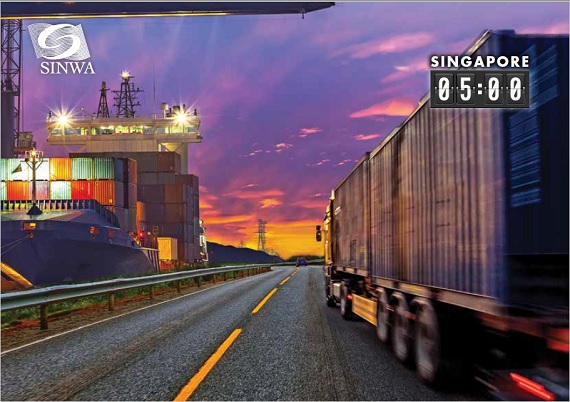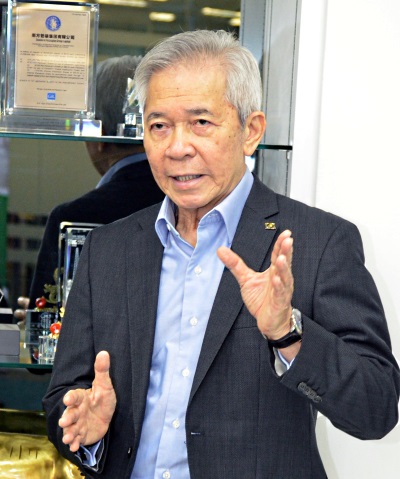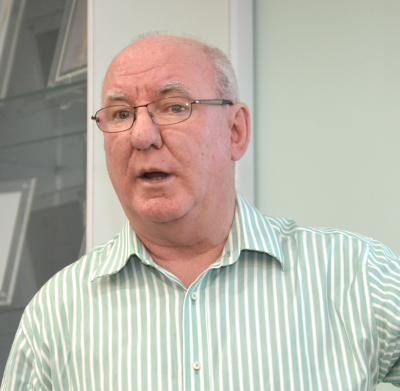 Sinwa provides a wide range of provisions and technical supplies to 100 ports in 4 countries. Photo: Company Sinwa provides a wide range of provisions and technical supplies to 100 ports in 4 countries. Photo: Company
THE SHARE PRICE of Sinwa, a leading vessel supplies and logistics services provider in Singapore, has performed admirably with a 21% return compared to -15% and -56% for the STI and STI Oil & Gas index, respectively, since mid-2014.
Oil prices have fallen by more than 50% since mid 2014 but Sinwa's revenue increased by 7.9% year-on-year to S$166.5 million in FY2015. Net margins improved from 5.5% in FY2014 to 5.8% in FY2015.
Other than resiliency in share price and earnings, it also kept up with its dividend payout over the past 3 years. Including special dividends that add up to 3.25 cents, total dividends paid in FY2015 amounted to 4 cents, translating into a dividend yield of a healthy 16% based on its recent stock price of 24.5 cents.
The Group has been paying special dividends every year since FY2013 from the sale proceeds of a liftboat and an anchor handling tug boat from its former chartering business.
There may be more special dividends in store.
The joint venture partner of its former chartering business has undertaken to acquire the 50% interest that Sinwa holds in a seismic vessel at a purchase price that is yet to be agreed upon. The Group's share of this 3rd and final vessel had a NAV of S$15 million as at 31 December 2015.
|
At Financial PR's Paid to Wait conference on 9 June, Executive Chairman Mike Sim, CEO Bruce Rann and CFO Elvin Law addressed questions raised by the investment community. Here is a summary of the questions raised and replies provided by the management.
| ♦ Business Outlook |
|
Q: How will the merger M&A between NOL and CMA affect Sinwa?

"Barriers to entry to the vessel supplies business are much higher now. You need freezer trucks, a warehouse, a large inventory and quality services.
"The days when you can deliver meat dripping in the hot sun are gone."
- Executive Chairman Mike Sim
Photo by Sim Kih
Mike Sim: We have been servicing CMA CGM for the past few years. It is a leading shipping group based in France. We have never supplied to NOL but when NOL becomes part of CMA, we hope to supply to NOL vessels as well. The impact will only be positive for us.
Bruce Rann: NOL has the buying power of V.Ships and OOCL.
Q: From which ports do you service CMA?
We service them in Singapore, Malaysia and China.
Q: What percentage of your revenue is from oil & gas and the offshore market?
Mike Sim: 80% of the Group’s revenue is from the shipping industry and 20% is from the offshore market. This revenue mix is why we have been resilient in these challenging times.
Q: How do you manage the volatile marine cycle?
There has been an improvement in the marine sector, especially for the operators of clean product tankers, chemical tankers, LNG and other gas carrier vessels. The shipping market is much more positive compared to the oil & gas market. Containerships with capacity for 10,000 TEU and above are doing reasonably well. Only vessels with capacity less than 8,000 TEU are doing badly because they lack economies of scale.
In the recent 3 months, there has been much interest in the second hand market for Panamax-sized bulk carriers (with capacity for about 65,000 DWT). This is a sign that ship owners believe the market has bottomed out.
|
|

"The market in Singapore is very competitive and dominated by the top 5 players, of which Sinwa is one.
“We are expanding by building new warehouses that will enable us to buy in bulk globally as well as bring a greater variety of products to Singapore.”
- CEO Bruce Rann
Photo by Sim Kih
|
Q: Why did your margins slide over the past few years?
Mike Sim: Margins in FY2011 and FY2012 were inflated by the contribution of the chartering business, which came from our 50% interest in a lift-boat rig. Deployment for the rig ended in 2012.
Since 2013, we have focused on our core business of marine supplies and logistics and our turnover has increased over the past 3 years as a result of business expansion in this area.
Our new facilities will enable us to hold 400% of the inventory we currently have capacity for.
We will have a freezer and chiller that will enable us to comply with HACCP certification for food safety when we buy meat directly from Brazil or France. The size of our new facilities will enable us to buy in bulk at a price that is much more competitive than what we are doing now.
Bruce Rann: Customers want a one-stop shop. Every one of them is looking to reduce their cost and for the one company where they can procure the majority of what they need. They want their ship supplies in one invoice with significant savings.
| ♦ Market Position |
|
Q: What do you think is your Singapore market share?
Mike Sim: We estimate that we have a 15% to 18% share in Singapore's vessel supplies market. Vessels come into Singapore for cargo, bunker, repairs and supplies.
Ships come to Singapore for its quality bunker. Singapore has clear transparent bunker trade. If a ship wants quality repair without delay, they will come to Singapore.
Whether they are here for cargo, bunker or repair, once here, they want to buy their provisions, technical stores, valves, ropes, etc because Singapore is the most reliable and efficient place for procuring vessel supplies. When a ship places orders for supplies here, at least 99% of its orders will be filled.
We have received an order for S$80,000 worth of provisions at 7pm and the customer expected it to be delivered by 2pm the next day.
Q: Do you have any customer concentration?
Mike Sim: We are the largest supplier to vessels from Greece in Singapore. Another big chunk of our business comes from ship owners from Singapore. We also have customers from Germany, Norway and Hong Kong and Singapore.
Q: Do you have any single major customer accounting for a large chunk of your business?
Mike Sim: In Singapore, our big customers are V.Ships and BP.
|
| ♦ Succession Plans |
|
Q: What is your succession plan?
Mike Sim: I have a good team in place and they will carry on. My son is not interested in taking over the business and I respect that.
We are always in negotiation for M&A that is related to the business. Two and two must be twenty and not four. That is why we have this war chest ready in cash reserves. Having an M&A is also related to getting the right management in place.
Ship chandlers don't sleep well. Bruce and I send emails to staff late into the night because Europe doesn't close until midnight. Six o’clock in Europe is around midnight in Singapore.
Q: What M&A targets are you looking at?
Mike Sim: It has to be synergistic with our core business geographically and expand our product range. In 2004, we acquired Windsor Marine, the exclusive agent and distributor of Wolf Safety Lamp in Singapore. This product range caters to explosion proof lighting needs in oilrigs. We did very well in that and would like to expand our product range.
More recently, we took on agency license for SPARTAN, a range of LED floodlights from the UK. The manager in charge is very experienced and is growing this business segment.
|
Q: Do you have any plans to pay a special dividend?
Mike Sim: We want to balance between debt-free in our expansion plans, keeping shareholders with dividends and having a war chest for M&A activities. We are constructing a new warehouse that costs S$12 million. This is entirely financed from internal reserves and we expect it to be ready in September 2016. We have total debt of S$2.8 million even though our cash reserves are S$27.6 million because we want to maintain relationships with our bankers.
Once this balancing act is done, we can look at how much dividend we can pay.
 Sinwa provides a wide range of provisions and technical supplies to 100 ports in 4 countries. Photo: Company
Sinwa provides a wide range of provisions and technical supplies to 100 ports in 4 countries. Photo: Company









